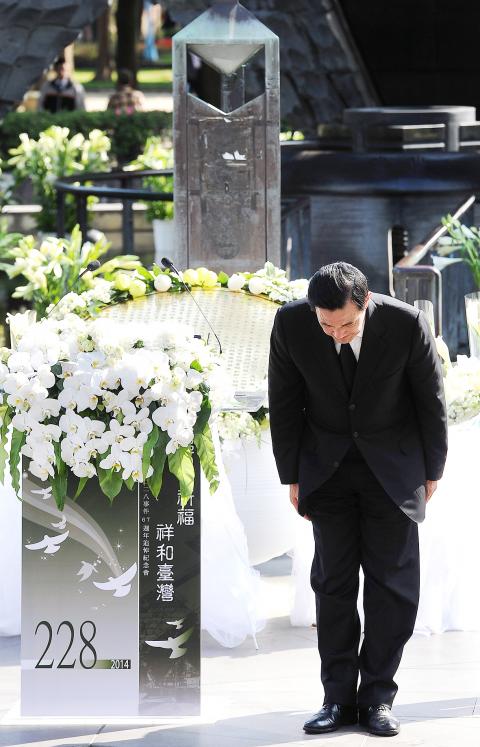President Ma Ying-jeou (馬英九) yesterday vowed to uncover the truth behind the killings in the 228 Massacre and defend human rights in an effort to prevent similar tragedies in the future.
“I will continue to pay attention to the 228 Incident and care about the families of the people killed no matter what role I take on. The government’s efforts to protect human rights and act in accordance with the law will not stop. We will not allow similar incidents to happen again,” he said in a speech at a memorial ceremony in Taipei’s 228 Memorial Park.
People and families affected by the 228 Massacre are invited to the annual ceremony in Taipei.

Photo: Liao Chen-huei, Taipei Times
Ma, accompanied by Taipei Mayor Hau Lung-bin (郝龍斌) and government officials, led guests at the ceremony in a moment of silence in honor of the people killed in the 228 Incident.
Ma, who has promoted efforts to bring reconciliation between the Chinese Nationalist Party (KMT) and families affected by the 228 Incident since serving as Taipei mayor, said he has attended memorial events over the past 20 years and that the efforts to offer a proper apology and uncover the truth would continue.
“Historical mistakes can be forgiven, but truths cannot be forgotten. I have asked the KMT’s history center to search for related documents about the incident to help uncover the truth,” he said.
Earlier yesterday, Ma addressed a state ceremony held in Hualien County to mark the event.
Before the ceremony, Ma led government officials to pay tribute as he laid a wreath at the tomb of Chang Chi-lang (張七郎), who was killed in the 228 Incident, and apologized to Chang’s family over his killing.
Having visited Chang’s grave three times to pay his condolences, Ma, who doubles as KMT chairman, said the party accepts responsibility for the death.
Chang was a National Assembly member who was killed by the then-KMT troops in the aftermath of the 228 Incident. His two sons were practicing medicine at a hospital their father founded in Fonglin Township (鳳林), Hualien County. They were also executed by the KMT after being accused of “betraying the party and the country” and “organizing assassinations.”
Chang’s grandson, Chang An-man (張安滿), thanked Ma for his efforts, but expressed frustration over the government’s definition of the 228 Incident as a civil uprising against the government. He said his grandfather did not oppose the government and was killed over groundless accusations.
“The government’s definition is a self-deception. If the government cannot face the truth, it will not find the path to reality,” he said.
Ma said he understood that the suffering and pain of the people killed in the incident and their family members could not be erased, and pledged to reveal the truth.
“We should work harder to uncover the truths behind the 228 Incident, and there should be no taboos or off-limits areas. I will spare no effort to reveal the truth,” he said.
Yesterday marked the 67th anniversary of the 228 Massacre, which refers to a brutal crackdown by the then-KMT regime starting on Feb. 27, 1947, against tens of thousands of Taiwanese, many of them among the intellectual elite. The incident led to nearly four decades of martial law in Taiwan.

Taiwan would welcome the return of Honduras as a diplomatic ally if its next president decides to make such a move, Minister of Foreign Affairs Lin Chia-lung (林佳龍) said yesterday. “Of course, we would welcome Honduras if they want to restore diplomatic ties with Taiwan after their elections,” Lin said at a meeting of the legislature’s Foreign Affairs and National Defense Committee, when asked to comment on statements made by two of the three Honduran presidential candidates during the presidential campaign in the Central American country. Taiwan is paying close attention to the region as a whole in the wake of a

President William Lai (賴清德) has appointed former vice president Chen Chien-jen (陳建仁) to attend the late Pope Francis’ funeral at the Vatican City on Saturday on his behalf, the Ministry of Foreign Affairs said today. The Holy See announced Francis’ funeral would take place on Saturday at 10am in St Peter’s Square. The ministry expressed condolences over Francis’ passing and said that Chen would represent Taiwan at the funeral and offer condolences in person. Taiwan and the Vatican have a long-standing and close diplomatic relationship, the ministry said. Both sides agreed to have Chen represent Taiwan at the funeral, given his Catholic identity and

Chinese Nationalist Party (KMT) Chairman Eric Chu (朱立倫), spokeswoman Yang Chih-yu (楊智伃) and Legislator Hsieh Lung-chieh (謝龍介) would be summoned by police for questioning for leading an illegal assembly on Thursday evening last week, Minister of the Interior Liu Shyh-fang (劉世芳) said today. The three KMT officials led an assembly outside the Taipei City Prosecutors’ Office, a restricted area where public assembly is not allowed, protesting the questioning of several KMT staff and searches of KMT headquarters and offices in a recall petition forgery case. Chu, Yang and Hsieh are all suspected of contravening the Assembly and Parade Act (集會遊行法) by holding

Lawmakers from the Democratic Progressive Party (DPP) yesterday established a friendship group with their counterparts in Ukraine to promote parliamentary exchanges between the two countries. A ceremony in Taipei for the Taiwan-Ukraine Parliamentary Friendship Association, initiated by DPP Legislator Chen Kuan-ting (陳冠廷), was attended by lawmakers and officials, including Deputy Minister of Foreign Affairs Francois Wu (吳志中) and European Economic and Trade Office in Taiwan Director Lutz Gullner. The increasingly dire situation in Ukraine is a global concern, and Taiwan cannot turn its back when the latter is in need of help, as the two countries share many common values and interests,